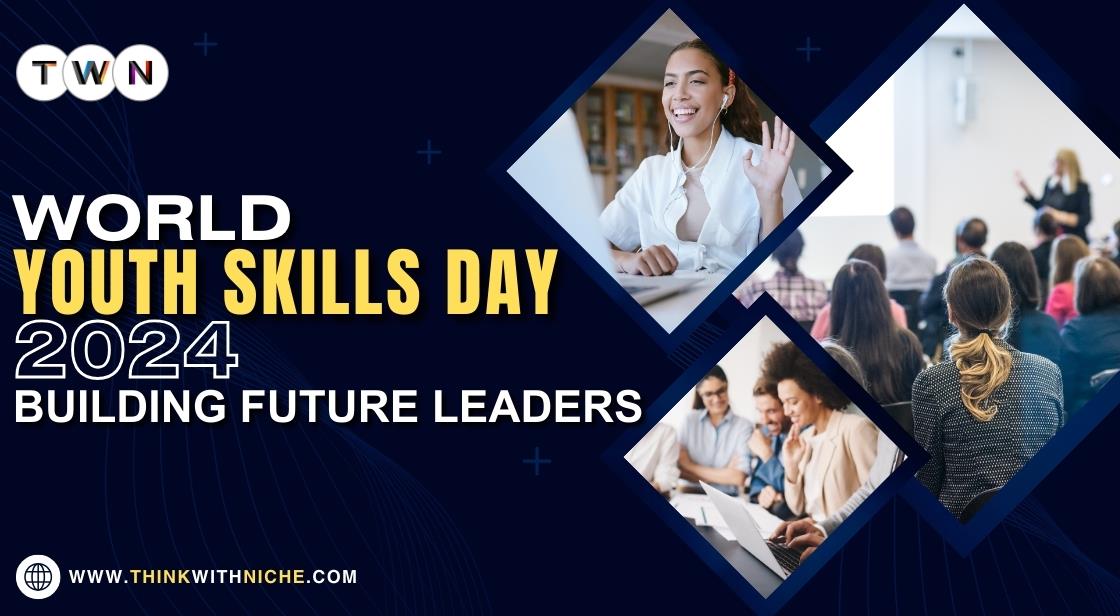World Youth Skills Day 2024: Building Future Leaders

Blog Post
World Youth Skills Day (WYSD), celebrated annually on July 15th, serves as a crucial platform to emphasize the significance of equipping young people with the skills needed for employment, entrepreneurship, and personal development.
Recognized by the United Nations, WYSD highlights the urgent need to address youth unemployment and foster sustainable economic growth through robust skills development. In today's rapidly changing world, where technological advancements and global market shifts continuously reshape industries, preparing youth with relevant and adaptable skills has never been more critical.
The theme for WYSD 2024, "Building Future Leaders," underscores the transformative power of skills development in shaping the next generation of leaders. It is a call to action for governments, educational institutions, businesses, and civil society organizations to collaborate and create an environment conducive to skill-building.
By focusing on youth, WYSD contributes to achieving several Sustainable Development Goals (SDGs), particularly Goal 4 (Quality Education) and Goal 8 (Decent Work and Economic Growth).
Skills development empowers young people by enhancing their employability, fostering innovation, and promoting social inclusion. It prepares them to navigate challenges and seize opportunities in diverse sectors such as technology, entrepreneurship, healthcare, and sustainability. Beyond immediate employment needs, WYSD promotes lifelong learning as a cornerstone of personal and professional growth.
It advocates for continuous skill upgrading and adaptation to technological advancements, ensuring youth are well-equipped to thrive in the jobs of tomorrow.
As we celebrate WYSD 2024, it is essential to recognize the barriers that many young people face in accessing quality education and vocational training.
Addressing these challenges and investing in youth skills development will not only benefit individuals but also contribute to the socio-economic advancement of communities and nations globally.
Enhancing Global Skills on Youth Skills Day 2024
World Youth Skills Day (WYSD), observed annually on July 15th, serves as a global platform to highlight the importance of equipping young people with skills for employment, entrepreneurship, and personal development. Recognized by the United Nations, WYSD underscores the critical role of skills development in addressing youth unemployment and fostering sustainable economic growth.
Significance of World Youth Skills Day
WYSD aims to raise awareness about the challenges faced by young people in accessing quality education and vocational training. It emphasizes the need for inclusive and equitable education and training systems that enable youth to develop the skills required for decent work. By focusing on youth, WYSD contributes to achieving the Sustainable Development Goals (SDGs), particularly Goal 4 (Quality Education) and Goal 8 (Decent Work and Economic Growth).
Theme for World Youth Skills Day 2024: "Building Future Leaders"
The theme for WYSD 2024, "Building Future Leaders," underscores the transformative power of skills development in shaping the next generation of leaders. It highlights the importance of equipping young people with the skills, knowledge, and competencies needed to succeed in a rapidly evolving global landscape.
Importance of Skills Development for Youth
Skills development empowers young people by enhancing their employability, fostering innovation, and promoting social inclusion. It prepares them to navigate challenges and seize opportunities in diverse sectors such as technology, entrepreneurship, healthcare, and sustainability. Investing in youth skills not only benefits individuals but also contributes to the socio-economic development of communities and nations.
Addressing Global Challenges
WYSD encourages governments, educational institutions, businesses, and civil society organizations to collaborate in creating conducive environments for skills development. It calls for policies that prioritize education and training, ensuring that young people have access to quality learning opportunities regardless of their background or circumstances.
Promoting Lifelong Learning
Beyond immediate employment needs, WYSD promotes lifelong learning as a cornerstone of personal and professional growth. It advocates for continuous skill upgrading and adaptation to technological advancements, preparing youth to thrive in the jobs of tomorrow.
Importance of Skills Development for Youth
Skills development is crucial for young people in today's world due to its multifaceted impact on their future prospects and personal growth.
Enhancing Employability
Acquiring relevant skills significantly enhances youth employability. In a competitive job market, employers prioritize candidates with practical skills that align with industry demands. Skills such as digital literacy, communication, critical thinking, and problem-solving not only make young individuals more attractive to employers but also equip them to adapt to evolving workplace dynamics. For instance, studies show that youth with vocational training or technical skills have higher chances of securing employment compared to those without specialized training.
Fostering Entrepreneurship
Skills development nurtures an entrepreneurial spirit among youth. By equipping them with business management, financial literacy, and innovation skills, it empowers young individuals to start and manage their ventures successfully. Entrepreneurial skills not only drive economic growth but also encourage creativity and initiative, essential traits for building sustainable businesses and contributing to local and global economies.
Facilitating Personal Growth
Skills training plays a pivotal role in personal growth and development. Beyond technical competencies, it cultivates soft skills like teamwork, leadership, time management, and resilience. These skills are invaluable in navigating various life challenges, enhancing interpersonal relationships, and fostering self-confidence. Research indicates that youth who participate in structured skill-building programs report higher levels of satisfaction and well-being, attributing their personal growth to newfound capabilities and increased opportunities.
Statistical Insights and Examples
Statistics underscore the benefits of skills training for youth. For Example, according to the International Labour Organization (ILO), youth unemployment rates decrease significantly among those with formal skills training compared to their peers without such qualifications. Moreover, case studies of youth empowerment programs globally highlight success stories where skills development has led to improved livelihoods, higher incomes, and community development.
Also Read: Tech-Driven Education Revolution: How Technology is Transforming Learning ?
Initiatives and Programs on World Youth Skills Day
World Youth Skills Day (WYSD) is marked by various initiatives worldwide aimed at empowering young people through skills development. Globally, organizations such as the International Labour Organization (ILO) and UNESCO lead efforts to raise awareness about the importance of youth skills. Locally, countries observe WYSD with events, workshops, and campaigns tailored to their socio-economic contexts.
Successful Programs and Partnerships
Numerous successful programs and partnerships have been pivotal in enhancing youth skills on WYSD. For example, Skill India, launched by the Government of India, promotes skill development among youth through vocational training programs and industry partnerships. Similarly, the European Alliance for Apprenticeships fosters collaboration between businesses, educational institutions, and governments to offer apprenticeship opportunities across Europe.
Role of Educational Institutions, Governments, and Organizations
Educational institutions play a crucial role in WYSD by designing curriculum enhancements, offering vocational courses, and organizing skill-building workshops. Governments worldwide allocate funding, create policies, and establish skill development initiatives tailored to youth needs. Organizations, both non-profit and private, partner with governments and educational institutions to implement innovative skill-building projects, leveraging their expertise and resources.
Example: United Nations Youth Skills Initiative
The United Nations Youth Skills Initiative exemplifies global collaboration on WYSD. It engages multiple stakeholders, including governments, educational institutions, and international organizations, to promote skills training, entrepreneurship, and employment opportunities for youth globally. This initiative supports sustainable development goals by equipping young people with skills essential for their socio-economic empowerment.
Essential Skills for Future Leaders
Technical Skills
Technical skills refer to specific abilities and knowledge required to perform tasks within a particular field or industry. For future leaders, proficiency in technical skills such as programming languages, data analysis, engineering, and digital marketing is crucial. These skills enable leaders to understand and leverage technology effectively, driving innovation and operational excellence in their organizations. For example, a young entrepreneur mastering coding can develop new software solutions, while an engineer proficient in advanced manufacturing techniques can lead efficient production processes.
Soft Skills
Soft skills are interpersonal and behavioral attributes that enable individuals to effectively interact with others and navigate complex situations. Future leaders must possess strong communication, teamwork, leadership, and problem-solving skills. These skills foster collaboration, inspire confidence among team members, and enable leaders to manage diverse teams and stakeholders successfully. For example, a project manager with excellent communication skills can articulate goals clearly and motivate their team towards achieving objectives, enhancing overall project success.
Digital Literacy
Digital literacy encompasses the ability to use digital tools and technologies proficiently. In today's digital age, future leaders must be adept at navigating digital platforms, understanding cybersecurity principles, and leveraging social media for networking and brand building. Leaders who are digitally literate can harness technology to streamline operations, enhance customer engagement, and drive business growth. For example, a marketing manager with digital literacy can analyze online trends, optimize digital marketing campaigns, and expand the organization's online presence effectively.
Contribution to Personal and Professional Success
Developing these essential skills empowers youth to become effective leaders in their respective fields. Technical skills equip them with specialized knowledge to innovate and solve complex problems, while soft skills enable them to communicate effectively, build relationships, and lead teams. Digital literacy ensures they remain adaptable in a digital-first world, leveraging technology to drive organizational success.
Collectively, these skills enhance their employability, promote career advancement, and empower them to make meaningful contributions to their communities and industries. By investing in these critical areas of development, young leaders can navigate challenges, seize opportunities, and drive positive change in an increasingly competitive global landscape.
Challenges Faced by Youth in Accessing Skill-Building Opportunities
Young people encounter several barriers that hinder their access to skill-building opportunities:
1. Lack of Resources: Many youth from disadvantaged backgrounds face challenges due to limited financial resources. This restricts their ability to afford education and training programs that could enhance their skills. Additionally, insufficient access to technology and learning materials further exacerbates this issue.
2. Access to Education: Inadequate access to quality education is a significant barrier. This includes limited availability of schools, vocational training centers, and qualified educators in rural or underprivileged urban areas. Poor infrastructure and lack of transportation options also prevent youth from attending educational institutions.
3. Socio-Economic Factors: Social and economic disparities play a crucial role in limiting youth from marginalized communities. Discrimination based on gender, ethnicity, or disability can restrict opportunities for skill development. Moreover, socio-economic status often determines access to networks and mentorship crucial for career advancement.
Solutions and Initiatives to Overcome These Challenges
Several initiatives and solutions can address these barriers and provide equitable access to skill-building opportunities for youth:
1. Financial Assistance Programs: Governments and NGOs can implement scholarships, grants, and low-interest loans to support economically disadvantaged youth. These initiatives help cover tuition fees, purchase learning materials, and access technology required for skill development.
2. Expansion of Educational Infrastructure: Investing in the establishment and enhancement of educational institutions, especially in underserved areas, can improve access to quality education. This includes building schools, vocational training centers, and providing necessary resources like computers and internet connectivity.
3. Outreach and Community Engagement: Organizations can conduct outreach programs to raise awareness about available skill-building opportunities. These programs should target marginalized communities and provide information on scholarships, vocational training, and career counseling.
4. Digital and Remote Learning Solutions: Promoting digital literacy and offering online courses can overcome geographical barriers. Digital platforms enable youth to access educational resources and skill development programs remotely, bridging the gap caused by limited physical infrastructure.
5. Mentorship and Support Networks: Establishing mentorship programs and support networks can provide guidance and career advice to young individuals. Mentors can share their expertise, offer encouragement, and help navigate the complexities of skill development and career choices.
6. Policy Advocacy and Collaboration: Advocating for policies that prioritize youth education and skills training is essential. Collaboration between governments, educational institutions, businesses, and civil society organizations can create sustainable solutions and maximize resources.
By addressing these challenges and implementing proactive solutions, stakeholders can empower youth with the necessary skills and opportunities to thrive in today's competitive global economy. These efforts not only enhance individual potential but also contribute to socio-economic development and inclusive growth.
Case Studies or Success Stories
1. Career Advancement through Digital Skills
Sarah, a 24-year-old from a rural community, joined a government-sponsored digital skills training program. Initially unsure about her future, Sarah learned coding and digital marketing skills through intensive workshops and online courses. Equipped with these new skills, she secured a remote job with a tech startup, doubling her income and gaining recognition for her innovative ideas in social media marketing.
2. Entrepreneurial Success in Tech Startups
John, aged 22, participated in an entrepreneurship program focused on tech innovation. With guidance from mentors and financial support from a startup incubator, John developed a mobile app to assist local businesses with inventory management. His app gained traction quickly, attracting angel investors and leading to a successful launch in multiple cities. Today, John's startup employs several individuals, showcasing the impact of skills training on fostering entrepreneurial spirit among youth.
3. Overcoming Economic Challenges through Vocational Training
Maria, 19, faced economic hardships and lacked access to higher education. She enrolled in a vocational training program specializing in hospitality management. Through practical training and internships, Maria developed essential customer service and management skills. She secured a job at a renowned hotel chain, where she quickly rose through the ranks due to her dedication and proficiency. Maria's success story illustrates how vocational training can empower youth to break free from socio-economic barriers.
4. Personal Growth and Confidence Building
Mark, 20, participated in a leadership and communication skills workshop offered by a local NGO. Initially shy and unsure of his abilities, Mark learned public speaking, team management, and problem-solving skills. The workshop boosted his confidence significantly, leading him to volunteer for community projects and eventually secure a scholarship for higher education. Mark's journey highlights the transformative power of soft skills training in shaping personal growth and career readiness.
5. Transitioning to Green Economy Careers
Emily, 23, transitioned from traditional farming to sustainable agriculture through specialized training programs. She learned organic farming techniques, water conservation methods, and environmental stewardship principles. Emily's commitment to sustainable practices not only improved her farm's productivity but also garnered attention from eco-conscious consumers and local markets. Her story underscores the importance of skills development in supporting careers aligned with environmental sustainability.
These case studies and success stories demonstrate the diverse ways in which skills development programs empower youth. From career advancements to entrepreneurial ventures and personal growth, skills training plays a pivotal role in shaping brighter futures for individuals across various socio-economic backgrounds. Through testimonials and interviews, these stories vividly illustrate the profound impact of acquiring new skills on improving lives and fostering resilience in today's competitive world.
Future Outlook
Evolving Landscape of Skills Development
The landscape of skills development is rapidly evolving, driven by technological advancements and shifts in global markets. As industries adopt automation, artificial intelligence, and digitalization, the demand for specific technical skills such as data analytics, cybersecurity, and programming languages is increasing. Future job markets will prioritize candidates with proficiency in these areas, reflecting a shift towards digital fluency and adaptability.
Emerging Trends in Skills Training and Education for Youth
Emerging trends in skills training are focusing on interdisciplinary learning and practical application. Educational institutions are integrating hands-on experiences, project-based learning, and internships to bridge the gap between classroom education and real-world demands. Personalized learning paths and micro-credentialing are becoming popular, allowing youth to acquire targeted skills efficiently. Additionally, there is a growing emphasis on soft skills like communication, critical thinking, and teamwork, which are crucial for navigating complex work environments.
Importance of Continuous Learning and Adaptation
In a rapidly changing world, continuous learning and adaptation are essential for career sustainability. Professionals must embrace lifelong learning to stay relevant and competitive. This involves upskilling and reskilling to meet evolving job requirements and technological advancements. Employers increasingly value candidates who demonstrate a willingness to learn and adapt, making ongoing education a cornerstone of career development.
Integrating Future Skills into Education Systems
Education systems are adapting to incorporate future skills into curricula from early education through higher education. This includes digital literacy, problem-solving, creativity, and resilience. Vocational training and apprenticeships are gaining traction as viable pathways to employment, offering practical skills aligned with industry needs. Governments and private sectors are collaborating to develop training programs that address emerging job market demands, ensuring youth are equipped for future career opportunities.
Leveraging Technology for Skills Development
Technology plays a pivotal role in democratizing access to skills development. Online platforms, virtual classrooms, and mobile applications provide flexible learning opportunities, especially for underserved communities. Gamification and immersive technologies enhance engagement and retention, making learning more interactive and enjoyable. Augmented reality (AR) and virtual reality (VR) are being used to simulate real-world scenarios, allowing learners to practice skills in a safe and controlled environment.
Conclusion
World Youth Skills Day empowers young people by fostering essential skills for future success. Ongoing support for skills development initiatives is crucial to prepare youth for evolving job markets. Stakeholders are urged to invest in youth skills to create opportunities and nurture the next generation of leaders.
You May Like
EDITOR’S CHOICE












